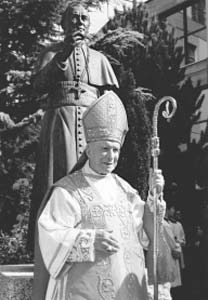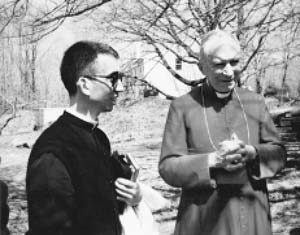

![]()
![]()
|
Newsletter of the District of Asia July - December 2005 Quod et Accepi Notes
for the reading and understanding of the By Fr. Daniel Couture
|
 |
|
| Archbishop
Lefebvre celebrating 40 years as a bishop, Oct. 3, 1987 |
An invaluable knowledge of the mechanism of the Vatican and its bureaucracy, due to his need to go there regularly (see Fr. Du Chalard’s article on p.10 of this Newsletter);
The experience required in the nomination of bishops (37 times in 10 years he had to present the ternae i.e. list of three names of candidates for the episcopacy). — This unique experience would prepare him for the great act of choosing with supernatural wisdom the four bishops of the SSPX in 1988;
A
greater love of the Unity and Catholicity of the Church in calling
toAfrica,
to Dakar especially, various Religious
Congregations from different
countries. — This will be invaluablelater
on in his efforts to save the
Church, not working only with or for his
SSPX but with many other religious traditional
communities.
In Tulle, as Archbishop-Bishop
(1962), he received:
A greater knowledge of the sorrows priests can meet with as a result of the de-christianization of a Catholic society and how to re-give them courage. — This, besides the knowledge he had acquired also in Africa, would lead him to make of the SSPX a “Society of Common Life…” where priests would be living in communities of 2-3 together; it also Archbishop Lefebvre celebrating 40 years as a bishop, Oct. 3, 1987 gives a model for SSPX priests for the time when Catholic Tradition will have regain possession of Rome, if and whenever they are to be called upon to help the restoration of torn apart and half dead dioceses;
A greater love for priests who fight alone for the Church — In later years, just as he supported traditional religious communities, he understood and supported as much as he could these respectable elders of the clergy who had been unjustly persecuted or betrayed by their bishop.
As the Superior General of the Holy Ghost Fathers (1962-1968),
he received:
The tragic proof of the dangers of the spirit of the world in the life a priest: he saw his Congregation swallowing the aggiornamento, this openness-to-the-world of Vatican II and heading for suicide; he saw many chapels of his Congregation being deserted in favor of the TV room; he saw priests abandoning their cassock, becoming worldly… — All these would later inspire him various rules to protect the spirituality of his young priests in the Society of St Pius X;
The sad proof that the liberal ideas he had seen in the Church back in his seminary years in Rome, had by now spread throughout the whole Church. — This was the tragedy of the II Vatican Council, and he concluded that to the same ills, one had to apply the same remedies: the teaching of the popes and of St Thomas Aquinas.
Finally, as Founder and First Superior General of the Priestly Society of St Pius X (1970 – 1991), then he delivered unto his priests the accumulated experience he had received during all these 41 years in the service of the Church, from his experience as an urban parish curate to being Apostolic Delegate for all of French Africa.
Deo gratias. “To them that love God, all things work out together for good.” (Rom. 8, 28). Indeed. The life of Archbishop Marcel Lefebvre is a clear illustration of this Paulinian principle.

Archbishop
Lefebvre and Fr. Daniel Couture,
after an ordination ceremony in Ridgefield, CT, USA, in April
1986